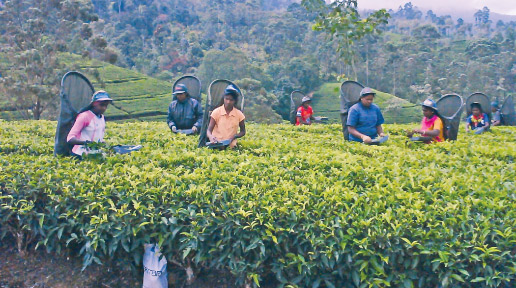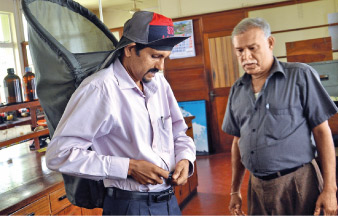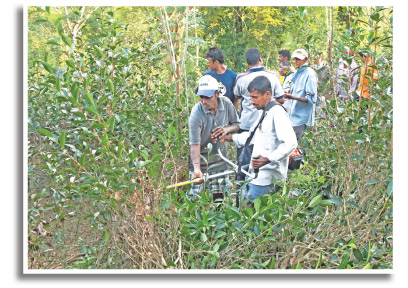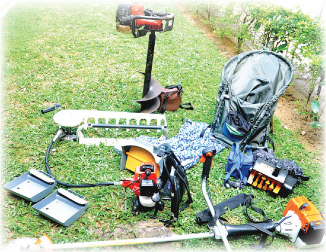Fillip for mechanisation of tea industry
By Gamini Warushamana
|

The new generation of tea pluckers in uniforms and equipped
with shears at Alton Estate, Talawakele
Pix: Susantha Wijegunasekera |
A project to popularise machinery in tea smallholdings was launched
by the Ministry of Plantations recently.
On a proposal of the Ministry, the Government allocated Rs.100
million for the purpose in 2013 Budget considering the serious issues
the tea industry faced as a result of the acute labour shortage.
Of the Rs.100 million, Rs. 67.5 million has been allocated for
awareness, training and supply of machines to selected smallholder
societies and factories and the balance Rs.32.5 million for research and
development on harvesting machines.
The Government disbursed Rs. 40 million and the Tea Research
Institute (TRI) has launched a program to train tea smallholders in the
use of new machinery under phase I of the program, .
Chairman of the Tea Research Board, Dr. Gerry Jayawardena said that
the investment in the tea industry would ensure the sustainability of
the industry. There was a threat of collapse of the tea industry in the
long run as a result of a severe labour shortage.
“This issue is common in the agriculture sector today and as a former
Director General of Agriculture I have experienced how mechanisation
could change the situation, specially our experience in paddy farming,”
he said.
|

Dr. M.A. Wijeratne (left) demonstrates the new plucking
basket |
“We made this proposal in the 2013 Budget and we have got the money.
This initiative will improve labour productivity and change the attitude
of the younger generation on plantation jobs,” Dr. Jayawardena said.
Senior Research Officer and the Officer-In-Charge of the TRI Low
Country Regional Centre, Ratnapura, Dr. M.A. Wijeratne said that in the
initial phase, 50 tea smallholder societies and 25 private tea factories
have been selected for the project covering all tea growing regions.
This training of trainers program is being conducted at the Ratnapura
regional centre.
It is a two-day residential training on the use of plucking shears
and machines. Two members from each society and Tea Inspectors of the
Tea Smallholding Development Authority will participate and 150 trainers
will be trained initially.
Training will be conducted on the use of tea plucking, pruning and
holing machines.
There are three machines for tea harvesting. The manually operated
shears, suitable for small tea lands, can double the output.
The battery-powered small machine can increase output by three times
and the large petrol machine can increase output five times.
A labourer can prune 250 tea bushes a day manually and with the
pruning machine this will be increased to 800-1,000 bushes a day.
The holing machine can increase labour productivity by over five
times. Dr. Wijeratne said that the training conducted irrespective of
gender and women received the training in operating all the machines.
|

Field training in progress |
The second level training will be launched in March and is expected
to create a huge impact on the tea smallholdings sector including
attitude change and forming of new service providers for harvesting,
pruning and holing.
The TRI provides a 50 percent subsidy to tea smallholders to purchase
the machines. Each society will get 10 shears, 10 baskets, one motorised
plucking machine, one battery operated plucking machine, one pruning
machine, one holing machine, worker overalls and safety gear which cost
around Rs. 350,000.
Dr. Wijeratne said that out of around 200,000 hectares of tea lands
in Sri Lanka 58% are smallholdings.
According to 2012 statistics the total tea production was 326 million
kilos and the estimated average production was about 1,600 kilos per
hectare per year.
Low productivity, high cost of production and declining quality are
the key issues faced by the tea industry today.
These issues are greatly related to lack of labour, high cost of
input and lack of mechanisation of labour intensive cultivation
practices such as plucking and pruning.
Plucking (harvesting of tea) is considered to be the most labour
intensive field operation in tea cultivation. More than 70 percent of
the workforce in a plantation is employed daily for plucking while about
35-40 percent of the total cost of production comprises cost of
harvesting.
More importantly, plucking policies influence growth, yield and
quality of the end product. Due to lack of workers, some tea estates are
either harvested at extended plucking rounds leading to loss of crop and
quality or are permanently abandoned leading to heavy crop losses to
estates.
Extended rounds can reduce tea crop by more than 20 percent. Due to
the nature of plucking operations in the field and due to fatigue, young
workers keep away from estate work. The quality of the end product is
affected when the harvested crop comprises of more coarse leaves (mature
shoots) due to delayed harvesting.
Being a major tea growing country with more than 95 percent of
production exported securing a premium prices in the world market, it is
extremely necessary to produce top quality tea, he said.
|

The machines that increase labour productivity |
A majority of the tea produced come from tea smallholdings, estimated
to be around 400,000. Although, it is expected that harvesting of
smallholdings is carried out by family labour, many use hired labour,
some of whom come from nearby estates.
This also has been identified as one of the causes for absenteeism of
workers in corporate sector tea estates.
In addition, corporate sector estates also face problems in finding
labour for their field practices.
Therefore, mechanisation of plucking has been identified as an urgent
need for ensuring sustainability of the tea industry, he said.
Dr. Wijeratne said that there is a rapid increase in mechanisation of
tea cultivation in the corporate sector.
Mechanised tea harvesting was initially implemented at Gawaravila
Estate, Hatton and at Alton Eastate in Talawakele and thereafter, in
many other plantation companies.
Today Grayton Estate, Kotagala has fully mechanised tea harvesting.
Evidence clearly demonstrates that mechanisation contributes greatly to
increase productivity and the quality of tea, he said.
Project activities and the training of trainer program is led by Dr.
Wijeratne and coordinated by the Officer-in-Charge, TRI Deniyaya centre,
Saman Ratnayake. |

